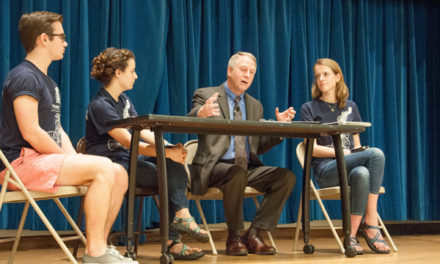After College Dean Robin Forman’s letter appeared in email inboxes across campus Friday afternoon, The Emory Wheel was not the only news organization eager for an explanation.
Media outlets across the nation wasted no time in spreading the information about the breaking news.
The Cavalier Daily, University of Virginia’s (UVA) student newspaper, openly criticized Emory University’s administration in a staff editorial “Running with Scissors.” The newspaper wrote that Emory administrators have ignored the lessons UVA learned in their so-called “leadership crisis.” This summer, the University’s Board of Visitors removed and reinstated UVA’s President Teresa Sullivan within less than a month.
“The abruptness of [Emory’s] drastic and apparently unilateral decision should frighten anyone with an interest or stake in higher education,” the paper stated. “This dean did not learn the lesson we gathered from June: that a decision made without buy-in is not only undemocratic and most likely misguided, but will bring unintended consequences and reputational damage.”
UVA was not the only university with an opinion on the dean’s decision. Yale Daily News reacted specifically to Forman’s justification that the journalism program was too pre-professional for Emory’s liberal arts program.
“After all, if Emory truly believes the line between liberal arts and career skills is so firm, it should ban future engineers from taking higher-level math courses; they might, you know, use those skills at work someday,” a Yale columnist wrote. “Future novelists? Stay away from literature, lest you dare to glean some inspiration from Dickens or Cervantes. Interested in a career in music? Sorry, those classes are restricted to the tone-deaf.”
Similar disdain for Forman’s decision was presented in the Guardian, a British daily newspaper – “Let’s hope this isn’t the start of a trend?”
Journalism centers, like the Poynter Institute, a nonprofit school for journalism, and the Knight Center for Journalism in America, a national seminar-based program, have given their own career-focused perspectives.
The Knight Center discussed the decision amidst the backdrop of its senior advisor’s recent statements, which encouraged universities to “embrace digital communication” and adopt a “‘teaching hospital’ model” to journalism construction.
“[This decision] contrasts sharply with recent calls for universities to improve journalism education by embracing the digital era, a necessary condition for keeping citizens informed and American democracy healthy,” the Knight Center said in a Sept. 15 blog post.
The Chronicle of Higher Education, a national academic newspaper, reported in an in-depth article on the campus’ shock at the news of the departmental changes and the effects of the news on Emory’s legacy.
According to the Chronicle, C. Aiden Downey, an assistant professor and director of undergraduate studies in the division of educational studies, was particularly concerned about undergraduates, who he saw as “tearful and shocked” by the news.
“The change also represents a blow to [Downey’s] career. After three years as a visiting professor [at Emory], Mr. Downey was in his first year on the tenure track. ‘It’s back to the uncertainty,’ he said,” the Chronicle reported.
Less than five hours after emails showed up in students’ inboxes, The Atlanta Journal Constitution provided a summary of the story and also explored University President James W. Wagner’s perspective on the University’s plan.
“[Wagner] endorsed the plan, saying Forman and others had the ‘willingness to go back to first principles, look at each department and program afresh and begin the process of reallocating resources for emerging needs and opportunities,'” the AJC article stated.
Then, as the story unraveled and backlash at Emory erupted, follow-up coverage offered insight into both sides of the conflict. Atlanta’s National Public Radio (NPR) and PBS stations highlighted the Quad protest which took place Monday afternoon.
Creative Loafing Atlanta, an alternative weekly paper, followed the ongoing story, covering the immediate backlash, protests and opposition to Forman’s announcement.
“Across the board, it appears that those involved with the suspended programs – staff, faculty and students alike – won’t be going down without a fight,” Creative Loafing reported.
The conversations surrounding Emory’s changes have picked up speed, and the talk of local news organizations, journalism centers and other universities have placed Forman’s decisions – and the Emory campus – in the national spotlight.
– By Karishma Mehrotra
The Emory Wheel was founded in 1919 and is currently the only independent, student-run newspaper of Emory University. The Wheel publishes weekly on Wednesdays during the academic year, except during University holidays and scheduled publication intermissions.
The Wheel is financially and editorially independent from the University. All of its content is generated by the Wheel’s more than 100 student staff members and contributing writers, and its printing costs are covered by profits from self-generated advertising sales.






as an emory grad this is humiliating. i think its time for a new university president.
and a new dean for emory collge
From the perspective of the Board of Trustees, the real power brokers at the University, Forman is an expendable stooge, brought in to effect these cuts and take other measures to raise Emory’s “eminence.” He was hired to do this, and though he might well be forced out – the AAUP is getting involved now, big time, and some of the terminations may be legally actionable – the powers-that-be are playing a much longer game.
One cannot begin to understand how this place works without reading “waking up blind”. A sad read but one that will open your mind to the inner workings of Emory. As in watergate, follow the money.